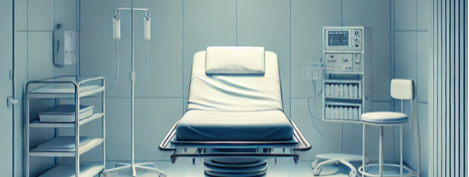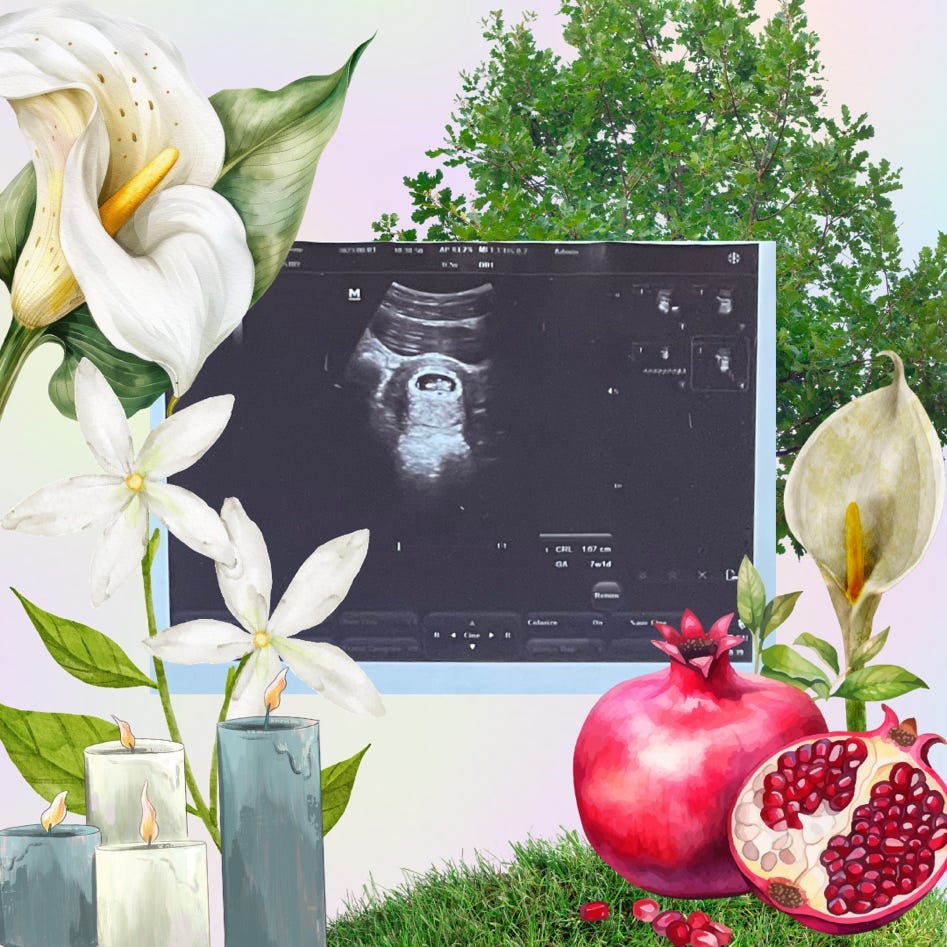Ohio, U.S.A.
xii. four hours before the procedure
My heart yearned every time any of our eyes met, searching within each other, longing to console one another, and yet none of us gambled to offer the expressive, knowing embrace we each deserved.
We, child-bearers sitting obediently in rows of fluorescent-lit pleather chairs, waiting patiently for our turns to bear no more, should be in ceremony. Instead, each of us either feigned stoicism or hid our expressions beneath a hoodie. So many hoodies hiding faces.
Each woman was alone (for our safety—hat tip to the apparently Christian people screaming pejorative epithets outside of the clinic). Isolated, each pretending our lives were not becoming irrevocably changed—together. Each sitting still and silent as if the most complex experience of creating and ending was not happening within the darkest parts of us—together. As if we were not all about to give a most hushed birth—together.
No intimacy; no hand holding, no embraces, no tears, no commiserating, no celebrating, no chanting, no dancing.
Just wait. Take this Tylenol pill and wait.
xiii. two and a half hours before the procedure
Five, or maybe it was six, medical staff stood before me in perplexion.
“She knew,” one, with a compulsion to interrupt even the smallest moment of silence, repeated to another, “she came in here and told us her veins like to roll. She knew.”
“I have just never seen anything like this before,” the smallest one looked at me with pity and heartache, “you poor child. We’ve made so many holes in you.”
“We have turned you into a pin cushion,” the stern-faced agreed, “you have no more spots to poke.”
“Let me try another finger, or maybe your ankle” the only Black one said, eyeing my body woefully, daring not to give up on me, clearly seeing herself in me, “I really want you to have that IV sedation for your abortion procedure.”
“We blew out her veins,” another with red hair said as she looked at her watch and began to walk away, “I am going to get the doctor and take a lunch break.”
For nearly two hours, the staff at the clinic attempted to feed my tiny veins with some synthetic version of poppy plants. None were successful.
When the staff, defeated by my body, finally left me alone, I trembled. I thought of my beautiful baby sister who gave birth to my gorgeous, smiley nephew one year prior. None of the anesthetics had worked for her either; nurses had apologized and hypothesized to her, too. How similar, and yet—so different, our birthing experiences would be.
Tears began to wander down my face. The nurse was right, I did know, even before I realized what I knew. None of the anesthetics were going to work.
I was meant to feel every supple moment of this experience.
Pain is a mother’s portal. Pain transports her to the infinite present moment. Pain roots the memory of her power within the base of her spine. Pain is intimacy with the deepest, wildest parts of herself. Pain is transformation. Pain is magic, as is she.
xiv. six weeks from our pleasure, eight weeks after my panic attacks
“Do you want to hold my hand?” The assisting physician’s cupid’s bow curled up in an empathetic anguish.
Startled she could see me, but grateful, I said “yes.” I grabbed her hand and relished its warmth in the refrigerated surgical room.
The doctor smiled at me between my knees.
“Here we go, okay,” she rushed an iced speculum into my vagina. Why so forceful. My breath snatched from my body. My pelvis lifted involuntarily.
“I’m going to insert a dilator now, okay.”
I began to hyperventilate. My chest heaved, and my abdomen cramped, loudly, with each squeaky click of the medical instrument that opened my cervix, centimeter by click by centimeter by click.
I could feel absolutely everything.
Tears poured out of me with an urgency. I could see their steam coming off my face.
“That was the worst part,” the doctor tried to reassure me.
But she was wrong.
The doctor used her hands to pump a manual vacuum into operation. The vacuum gasped repetitively as it plucked my first born from her attachment to my womb.
Shocked. I wheezed in search of a rhythm for my lungs.
“They’re taking her away from us,” every organ in my body yelped at once, consoled one another, mourned together. I cried harder. Everything was coming out.
The doctor emptied the contents of my uterus into a dish that I was not permitted to bring home with me.
(And I had spent hours on the phone with lawyers, funeral directors, and physicians trying to convince them otherwise. “But it is my embryo! It’s my placenta! Let me have a ceremony!”)
My pregnancy was over.
The assistant used her free hand to help me sit up, as my body cramped in agonizing hues of red. The doctor asked if I would like to see my embryo before they disposed of her. I nodded.
And moments later, there she was, rinsed of my blood, floating next to my uterine lining, placenta submerged in a medical dish, a wispy collage of tissue, pure white, evidence of every color from the ethereal rainbow that created her.
There’s no way to end these series of stories (read: Parts I, II, III, and an Interlude), because the stories have no ending. But allow me to conclude by offering a few important things and asking a few important questions.
The sensation of my womb conspiring to create an entirely new universe was an incredible experience. My womb demonstrated to me, with deeper understanding than I would have ever known to seek, I am a powerful creator of universes. Nothing exists without me, my attention, my participation. What am I creating in this very moment?
Abortion (and miscarriage) are forms of birth, with physiological and psychological experiences that intersect in sacred ways. It astounded me to experience, with the most intimate parts of me, how the legal system, and the religious systems that sustain it, change the relationships we have with our bodies, each other, and even our own tongues. Our movements, e.g. pro-choice or pro-life, that center the law or the legal system, sterilize our most sacred experiences and we all suffer for it. Millions of people, who are experiencing miscarriages and abortions every year, are birthing in silence, shame, and without the community-love we are each entitled—and need. The law is not a guide. The law is a gatekeeper, a barrier, and even an illusion. How am I allowing systems that cannot love me to define me and my experiences?
I am not, and nobody is, a victim. Unless I am a child, and often even then, I am the curator of my life. And though I may have endured hateful and terrible things, in each decision I made leading up to the terrible thing’s manifestation, in each decision I made in the terrible thing’s aftermath, I have held a key to my own freedom. As my dad aptly told me one day recently, “your reality is of your own making.” How can I continue to exercise my inherent liberation?
Even when things feel very much like they’re not okay, I am always okay. More than okay. The moment I realized my own longing for physical intimacy, in my state of grief and transformation, opened me up to a most intimate deception, I stepped into the Indian Ocean and cried out: WHY?! The ocean responded with a wave so big it soaked my dress up to my collarbone. As its warm waters pulled away from my ankles, back into the ocean’s depths, my burdens were pulled away with it. You have lost nothing, the ocean whispered, gathered as source, as she massaged my feet. You have only gained breaths that can now reach even deeper into your heart’s space. You are safe. Breathe. And surrender. Am I able to recognize the many ways I am being loved and cared for even in the moments that feel treacherous?









Thank you for sharing it made me cry you’re writing is beautiful. A powerful piece and a powerful insight. Thank you. I carry my little poppy seed everyday in my heart ❤️
All I can say is, wow.
This raises so many questions and takes my mind to so many places and peoples, to my mom, to all mothers, all women, to everyone who had to experience pain for one reason or another, when the possibility of not having to endure it was there.
I'm sorry for your loss and happy for your joy, as I'm sure there are myriads of emotions tied to this tale, to this birth, to this death. As a pre-med student, this reminds me to be human in the cold, medical room; we feel pain, and we can't tell who's in how much pain.
The voice over was more than just a voice over. It was a soulful performance and telling of this story. From one creative to another, very damn well done. I'll make it a point to read the other parts of this series.